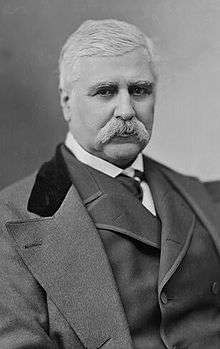James G. Berret
| Col. James G. Berret | |
|---|---|
 | |
| 18th Mayor of Washington, D.C. | |
|
In office 1859 – September 14, 1861 | |
| Preceded by | William B. Magruder |
| Succeeded by | Richard Wallach |
| Delegate to the Maryland State Legislature | |
|
In office 1835–1837 | |
| Delegate to the Maryland State Legislature | |
|
In office 1891–1892 | |
| Personal details | |
| Born |
James Gabriel Berret February 1, 1815 Carroll County, MD, U.S. |
| Died |
April 14, 1901 Washington, DC |
| Political party | Anti-Know-Nothing-Party, Democratic |
| Religion | Roman Catholic |
James Gabriel Berret (February 12, 1815 – April 14, 1901) was an American politician who served as a Maryland state legislator from 1837 to 1839 and again in 1891 and as the eighteenth Mayor of Washington, District of Columbia, from 1858 to 1861, when he was forced to resign from office after being jailed by the Lincoln administration for sedition. He was also President of the Electoral College in 1888.[1]
Berret was born in what was then Baltimore County, Maryland on February 12, 1815. He had only two years of formal education before his father pulled him out to help on the farm. When his father died in 1831, Berret took over the farm full-time. In 1836, at the age of 21, he was elected to the Maryland state legislature to represent the newly formed Carroll County. He served two one-year terms from 1837 to 1839.[2]
Upon leaving the legislature he was appointed to an office in the U.S. Treasury by President Martin Van Buren and moved to Washington, DC. He served in the Treasury until 1850, at which time he started his own business prosecuting claims before the US government.[2] That work continued until 1853 when President Franklin Pierce appointed him Postmaster of the District of Columbia.[3] He served on the inaugural committee for Presidents James Buchanan and Abraham Lincoln.[1]
In 1858, Berret was nominated as the mayoral candidate for the Anti-Know-Nothing Party, a coalition of political parties that formed in 1854 as an opposition to the Know-Nothings' electoral successes in the city. He was a staunch believer in the rights of naturalized citizens to vote. However, by 1858, the Know-Nothings were a spent force, and the U.S. political landscape was such that the Republicans, who had once been a part of the Anti-Know-Nothing coalition, now stood independently from it as an opposition to President Buchanan and the Supreme Court's decision in Dred Scott v. Sandford. Thus Berret was pitted against Richard Wallach, the U.S. Marshal for the District; both men were of equal popularity, means, and political reputation, but on election day Berret won by 680 votes in an election that was marked by rioting, requiring the Marines to deploy, and the deaths of four citizens.[2]
The election sparked a fierce rivalry between Wallach and Berret, enough so that when Berret defeated Wallach again in the 1860 contest by only 24 votes, Wallach published editorials in every Washington newspaper charging Berret with massive fraud in both elections.[1]
With the outbreak of the Civil War in 1861, the Republicans in the U.S. Congress pushed through legislation that required all public officers in Union territory to take oaths of allegiance to the United States. When Berret refused, insisting that his oath as mayor of the nation's capital should suffice, Secretary of State William H. Seward had him arrested,[4] jailed in the Old Capitol Prison, then sent to Fort Lafayette, New York.[5] Three weeks later, when no evidence of collaboration with the enemy surfaced, Seward had Berret released and returned to Washington—on the condition that he immediately resign as mayor. Berret telegraphed his resignation to the Washington City Council, who had already elected Wallach to replace him.[1]
Berret eventually became friends with Lincoln, although he declined when the President offered to appoint him commissioner of the emancipation of slaves in the District of Columbia. However, he accepted Ulysses S. Grant's nomination to the board of police commissioners in 1872, where he served until 1877.[6]
He moved back to Maryland and was an Elector for Maryland in 1888, and as such was named President of the Electoral College that year. He was returned to the Maryland legislature representing Carroll County in 1891, serving on the Ways and Means committee. He later served on the inaugural committee for President Grover Cleveland and as the first Vice-President of the Washington Monument Society.[7] Berret died April 14, 1901 from the flu and was buried in Congressional Cemetery in Washington, DC. His last residence in Washington was at 1535 I Street N.W.[3]
The Berret School in Washington, DC was named in his honor. It was closed in the 1950s, but the building was eventually converted to condos in 2000 and it is now called the Berret School Lofts.
References
- 1 2 3 4 Records of the Columbia Historical Society, Washington. Vol. 21. Washington: Columbia Historical Society. 1918. pp. 200, 209–211.
- 1 2 3 "Mr. Berret Dying" (PDF). The Evening Star. April 13, 1901. Retrieved 2 May 2016.
- 1 2 "Berret, James G.". Congressional Cemetery. Retrieved 2011-08-09.
- ↑ "The Arrest of James G. Berrett, Esq., Mayor of Washington". The Baltimore Sun. August 26, 1861. p. 1.
- ↑ "Local Affairs in Washington". The Baltimore Sun. August 26, 1861. p. 4.
- ↑ "Journal of the executive proceedings of the Senate of the United States of America, 1871-1873". Friday, December 13, 1872. Library of Congress — American Memory. Retrieved 2011-08-09.
- ↑ Inaugural ceremonies of Grover Cleveland, president and Adlai E. Stevenson, vice-president. March 4, 1893, Internet Archives.
| Political offices | ||
|---|---|---|
| Preceded by William B. Magruder |
Mayor of Washington, D.C. 1858–1861 |
Succeeded by Richard Wallach |